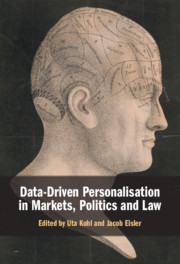
- Publisher:
- Cambridge University Press
- Online publication date:
- July 2021
- Print publication year:
- 2021
- Online ISBN:
- 9781108891325

The most fascinating and profitable subject of predictive algorithms is the human actor. Analysing big data through learning algorithms to predict and pre-empt individual decisions gives a powerful tool to corporations, political parties and the state. Algorithmic analysis of digital footprints, as an omnipresent form of surveillance, has already been used in diverse contexts: behavioural advertising, personalised pricing, political micro-targeting, precision medicine, and predictive policing and prison sentencing. This volume brings together experts to offer philosophical, sociological, and legal perspectives on these personalised data practices. It explores common themes such as choice, personal autonomy, equality, privacy, and corporate and governmental efficiency against the normative frameworks of the market, democracy and the rule of law. By offering these insights, this collection on data-driven personalisation seeks to stimulate an interdisciplinary debate on one of the most pervasive, transformative, and insidious socio-technical developments of our time.
‘Exploring the societal sea changes that emerge from the unleashed power of data-driven personalization, Uta Kohl and Jacob Eisler are gifting us a book that is the intellectual equivalent of a beautiful flower bouquet: a diverse and colorful, yet carefully chosen and elegantly arranged set of contributions from scholars representing different disciplines, perspectives, and temperaments, making it an insightful collection that is more than the sum of its individual parts.’
Urs Gasser - Executive Director, Berkman Klein Center for Internet & Society and Professor of Practice, Harvard Law School
‘With vision and panache, Kohl and Eisler, and their contributing authors, identify the hidden perils of the 'personalisation' phenomenon and boldly ask whether its apparent benefits of a 'close personal fit' and efficiency can ever outweigh the damage done to individual agency and communal solidarity, or to our aspirations of equality. Invaluable insights for the policy and legal debates on the use of predictive algorithms in politics, markets and law, which are upon us.’
Paul De Hert - Vrije Universiteit Brussels, Tilburg University
 Loading metrics...
Loading metrics...
* Views captured on Cambridge Core between #date#. This data will be updated every 24 hours.
Usage data cannot currently be displayed.